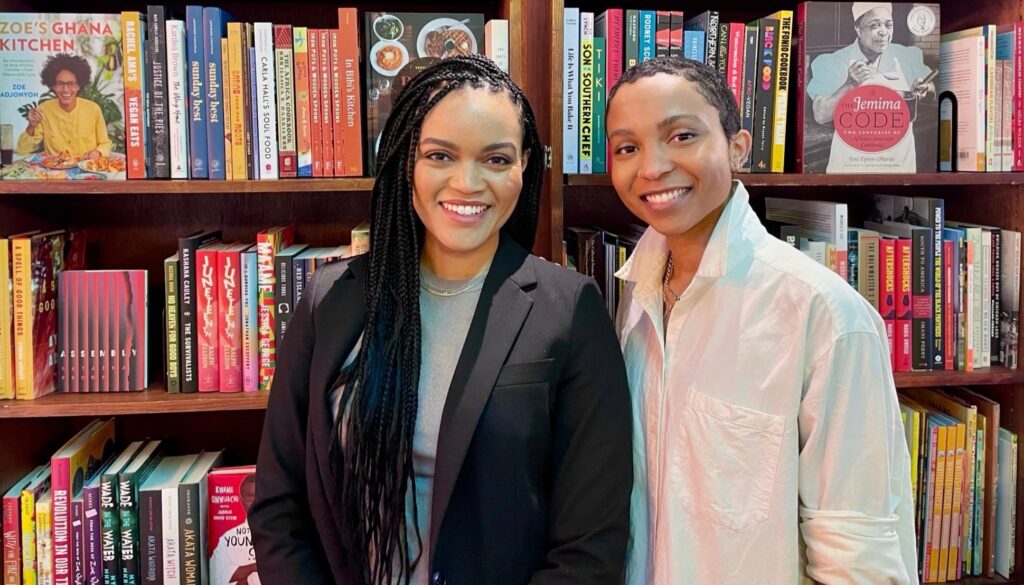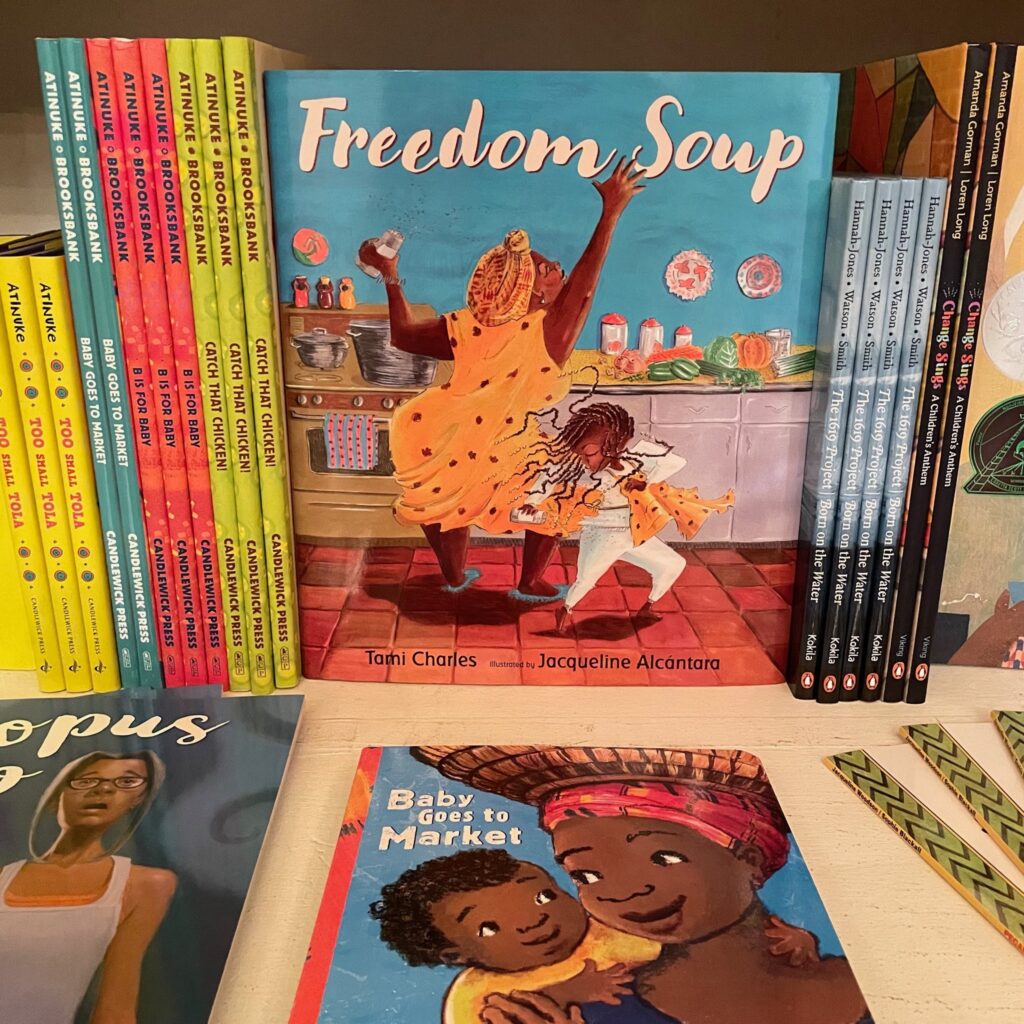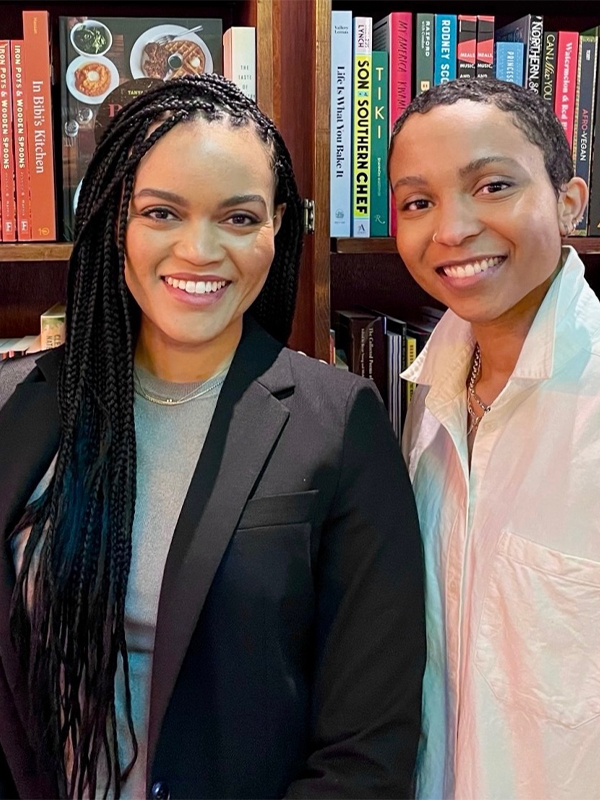When sisters Gabrielle and Danielle Davenport decided to start a business together, they wanted a project that combined everything they bonded over during their hours-long phone conversations: Black culture, books and food.
They had also never seen a bookstore focused on Black food; it felt new, exciting and much-needed. So they opened BEM | books & more in 2021, a Brooklyn-based bookstore centered on Black food writing.
The sisters have both lived in a few places—New Jersey, the Bay Area and now New York (both are Barnard College graduates). But “what was always constant is that we were always gathering in the kitchen,” says Danielle. “We’ve both spent a lot of time cooking with our mom and aunts and grandparents.” For the Davenport sisters, a business model focused on food literature felt like a natural next step.

At first glance, BEM’s mandate might seem incredibly niche. How could a bookstore fill itself with only food writing and only Black food writing at that? But that’s the exact first assumption Gabrielle and Danielle seek to dismantle through BEM, showing the range, diversity, legacy and vitality of African diasporic foodways.
It’s a model that seems to be working for them, a differentiating quality that sets them apart from New York’s seemingly rising bookstore trend.
BEM keeps its scope narrow and close to home. The name of the bookstore itself is its own kind of archival exercise, carrying on family legacies that have helped inspire its overarching theme. “BEM comes from our maternal grandmother’s initials, Bernice Marjorie,” says Gabrielle. “She was an amazing cook. There are so many stories of her house on Shepherd Ave and everybody coming through to stay for a spell or just be over for an afternoon.”
That familial energy is palpable in the space. Artists and visitors mill about, discussing installations, browsing book titles and grabbing food from the café, which features baked goods and coffee from Black vendors. It all feels like a cohesive market, filled with like-minded people achieving different creative goals together.
While they are actively fundraising to have an eventual brick and mortar location of their own, BEM is currently housed within BRIC, a Brooklyn-based non-profit that provides cultural programming and support for artists (its selection of books is also available online). Gabrielle worked for BRIC previously, so being in the space has “been a sort of homecoming,” she says. “They are lovely and gracious hosts, so it’s been a good partnership for us.”
BEM doesn’t just stock cookbooks but also novels, non-fiction, poetry and children’s literature by greats like Toni Morrison, Warsan Shire, Zora Neale Hurston and Bell Hooks—authors whose work you wouldn’t automatically think belong in a food bookstore. This broad inclusion isn’t meant to deviate from their food-based focus but to enrich it.

Gabrielle tells Sweet July that in the beginning stages of planning, the sisters were eager “to work across genres where food shows up in different kinds of ways.”
One reason why they don’t simply include cookbooks is because Black food is largely passed down orally—due to both our African traditions of oral cultural inheritance and laws that prohibited us from reading and writing during enslavement in the Americas. Therefore, the work of archival preservation is that much more urgent. And those archives can sometimes be found in a work of fiction, where a scene involving a character cooking might actually reveal the recipe, or explain why that meal is culturally or historically significant, or even give a glimpse into tricks to making it.
One book that has taught me something significant about African diasporic foodways is Nnedi Okafor’s Akata Witch, which has a scene of a character making Nigerian-style fish pepper soup. I was able to see its parallels to the Trinidadian dish of fish broff, but also adapt my family recipe to include new Nigerian flavors. It’s now a staple in my comfort food rotation.
Some of the Davenport sisters’ favorite books are ones that explore this hyper-specificity of cultural and regional cuisine. They have books on East African cuisine like In Bibi’s Kitchen: The Recipes and Stories of Grandmothers from the Eight African Countries That Touch the Indian Ocean by Hawa Hassan with Julia Turshen and books by Black Jewish authors like Michael Twitty. One of Gabrielle’s favorite books they have in stock is Bress ‘n’ Nyam: Gullah Geechee Recipes from a Sixth-Generation Farmer by Matthew Raiford and Sallie Ann Robinson’s Gullah Home Cooking the Daufuskie Way: Smokin’ Joe Butter Beans, Ol’ ‘Fuskie Fried Crab Rice, Sticky-Bush Blackberry Dumpling, and Other Sea Island Favorites.
“We have quite a lovely collection of low country cuisine,” says Gabrielle. “Sallie Ann Robinson, in particular, is an iconic cookbook writer of the region. And for newer writers, we’re seeing them put their family story on the page. There’s so much texture that it doesn’t feel like an either/or—these formulaic recipes or an oral tradition or learning by hand or cooking with vibrations. It’s all kind of blurring together.”
With that mentality, how they determine which books belong in the category of Black food writing continues to be, as Danielle says, “an ever-evolving rubric.” Sometimes, it is the mention of food in a particular scene that’s key to the rest of the story—that’s enough to include it.
Sometimes it’s in the title of the book,” she adds, citing a scene about biscuits in Toni Morrison’s Beloved that has a pivotal scene including biscuits, or Charmaine Wilkerson’s Black Cake, which places a traditional Caribbean dessert at the center of a family epic dealing with colonialism, sexual violence, love, adoption and grief. “But ultimately, we’re interested in providing a platform for great Black writers who are dealing with the things that make us human—food is one of those things. There’s so much life that happens around the proverbial table.”
Featured image: Courtesy of BEM | books & more







